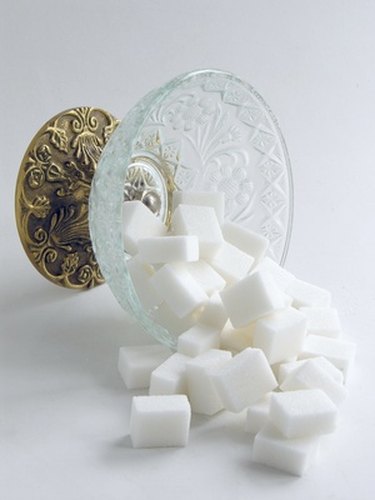
Lactose and sucrose are both common kinds of sugar that feature prominently in the typical American diet. Though chemically similar in many regards, your body digests them differently, using different digestive enzymes. They also have different sources in food. It's more common for people to be lactose intolerant, but sucrose intolerance is quite rare.
Lactose Chemistry
Video of the Day
Lactose is a kind of sugar, which is a subtype of carbohydrate, explain Drs. Reginald Garrett and Charles Grisham in their book "Biochemistry." Specifically, lactose is a disaccharide, meaning it's a sugar made up of two smaller sugar units. Glucose and galactose, when chemically bonded together, form lactose. When you digest lactose in the small intestine, you break it into glucose and galactose. Your intestine then absorbs those smaller sugar units independently.
Video of the Day
Sucrose Chemistry
Like lactose, sucrose is a disaccharide. It's made up of the smaller sugar units glucose and fructose. As with lactose, you must break sucrose into its constituent units in the small intestine prior to absorption; your body can't absorb sucrose directly. One of the major differences between sucrose and lactose as far as you can detect is the sweetness; sucrose is significantly sweeter. The caloric content of the sugars is identical, however; each provides 4 calories per gram.
Intolerance
A major difference between lactose and sucrose with regard to digestion and processing is that it's not uncommon for individuals to be lactose intolerant, but it's quite rare to be sucrose intolerant. Lactose intolerance results from an inability to break lactose into its constituent components; it's a result of insufficient lactase production, where lactase is the enzyme used to digest lactose. Sucrase deficiency results in sucrose intolerance, where sucrase is the enzyme that digests sucrose. The Genetics Home Reference website, maintained by the National Institutes of Health, notes that sucrase deficiency is genetic, and occurs in less than 0.0002 percent of the population.
Other Differences
Another major difference between sucrose and lactose is that lactose falls into a category of sugars called "reducing sugars," while sucrose does not. Reducing sugars can participate in chemical reactions that non-reducing sugars can't, such as bonding to additional sugar units to form longer carbohydrate chains. While this doesn't affect the nutritional content or value of either lactose or sucrose, it's nonetheless an important chemical difference, and is one of the ways chemists test a sample of sugar to determine its identity.